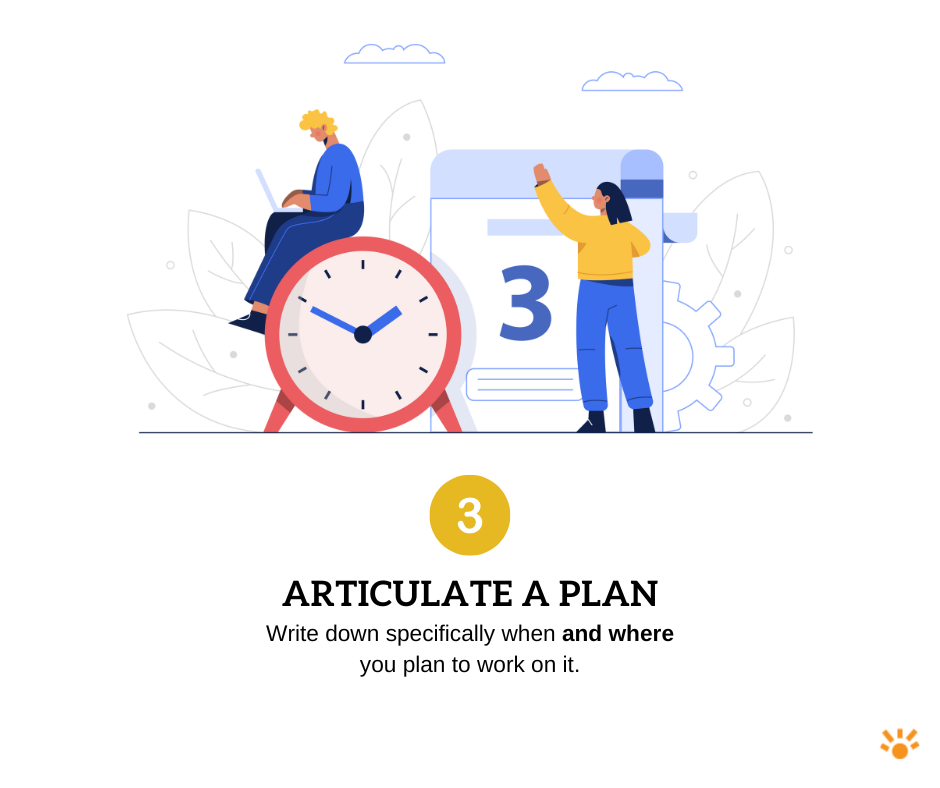3 Steps That Will Get You to Take Action
[Reading time: 2 minutes 30 seconds]
At the end of the summer, Tricia Rogers, a speech-language pathologist, decided to get started on shifting her business to a online, non-clinical format. Her short-term goal was to re-organize her home office and develop a plan for how to shift her 20+ years of knowledge into content she could use to educate others. Her long-term goal was to work on time management, personal productivity, and content creation.
Each week she wrote out a detailed plan for how she was going to work on these things. And each week she did nothing.
Sound familiar?
Tricia said, "When I think about all the things I need to do, I feel overwhelmed - and that there isn't enough time to do everything."
Everyone I've worked with says the same thing.
We have big ideas, we want to accomplish great things, and we feel buried by the magnitude of the vision. Here's the good news: There's an easy way to get your brain to take action.
It starts with how you feel

Maya Angelou said "...people will forget what you said, people will forget what you did but people will never forget how you made them feel."
Our tasks make us feel things too!
If we accomplish a lot, do a good job, create something lovely or cook a delicious meal, we feel satisfaction, joy, pride... If we fail to do a good job, waste time, procrastinate on important tasks or burn the dinner, we feel sad, depressed, frustrated...
There's no getting around the fact that we are emotional beings - and that emotion is often what drives us to take action (or not).
When we procrastinate, it doesn't take long before it's not the task that's the problem as much as how we feel about ourselves for not doing it.
I asked Tricia if she had an exercise program and she said "Yes. I walk every day!" Then I asked why she walked every day. Her response was:
- It's good for my health.
- It's nice to be outside.
- The dog needs to go out.
- I'd like to have an exercise routine.
Here's the "why" that got her to take action:
 All the answers are relevant but the really compelling reason behind this daily walk actually has to do with... the dog.
All the answers are relevant but the really compelling reason behind this daily walk actually has to do with... the dog.
We know that walking is good for our mental and physical well-being and yes, it's nice to be outside - but every time Tricia didn't go for a walk, the dog would look at her longingly and she would feel guilty. And every time she did go for a walk, she could see that the dog was happy which made her feel great about having done a good deed for him. (btw that great good feeling is the dopamine release in the prefrontal cortex).
At the start of our brief coaching session, she remarked on her newly-tidied up office. There were no piles/clutter and she was obviously pleased to have her workspace in order. I said, "since we're talking about why... why DID you clean up the office?"
Turns out she was tired of feeling bad every time she looked at the mess.
![]()
These 3 steps will get you to take action:
- LAY THE GROUNDWORK
Identify the task you are avoiding, think about why you want it done, tune into the feeling of accomplishment when you've done it, and create a visual, positive reminder.
• Are you avoiding marketing your business? Make a collage of yourself laughing at your desk with phone calls coming in and a stack of money by your computer.
• Are you avoiding an exercise plan?
Use canva.com to create an image of yourself, arms outstretched, crossing the finish line after completing a marathon - or whatever embodies the great good feeling that comes from knowing you have an established exercise routine. - MAKE INCREMENTAL PROGRESS EASY

Mark Twain said, "The secret of getting ahead is getting started. The secret of getting started is breaking your complex overwhelming tasks into small manageable tasks, and starting on the first one."
If it's a time-based task, break it down by just spending 15 or 20 minutes a day. (If you are really dreading the task, make it 10 minutes.)
If it's a large project, break it down into a series of smaller steps that can be done in shorter periods of time. - ARTICULATE A PLAN
In 2001, a study on exercise in Great Britain showed that people who took the time to write down a specific exercise plan were more than twice as successful then those who did not.
- Control group #1 was asked to track how often they worked out.
- Control group #2 tracked how often they worked out - and they also read about the benefits of working out.
- Control group #3 tracked their workouts, read about the benefits, and wrote down a specific plan detailing when and where they would work out.
Control groups 1 and 2 were 35 - 38% successful in their exercise goals. Control group 3 was 91% successful.
Articulating a plan for where and when you're going to work on it is the key!
![]()
Wise words from Tricia... a week later:
"I used the timer for 10 minutes to tackle some piles of paper (My name is Tricia and I am a “Piler”!!). As you predicted, if you just set the timer and START, you may keep working and finish. I re-set the timer 3 times and finished the whole pile.
On another note, I never considered myself a procrastinator, but I realize that I AM!
THANK YOU for all you do for our Brains!"
![]()
Do you need some BIG HELP to address your procrastination challenges?
Check out my Take Action Now Bootcamp for Procrastinators
Take Action Now Bootcamp for Procrastinators
Stay Connected
Join our mailing list to receive new blog posts.
Don't worry, your information will not be shared.
We hate SPAM. We will never sell your information, for any reason.


